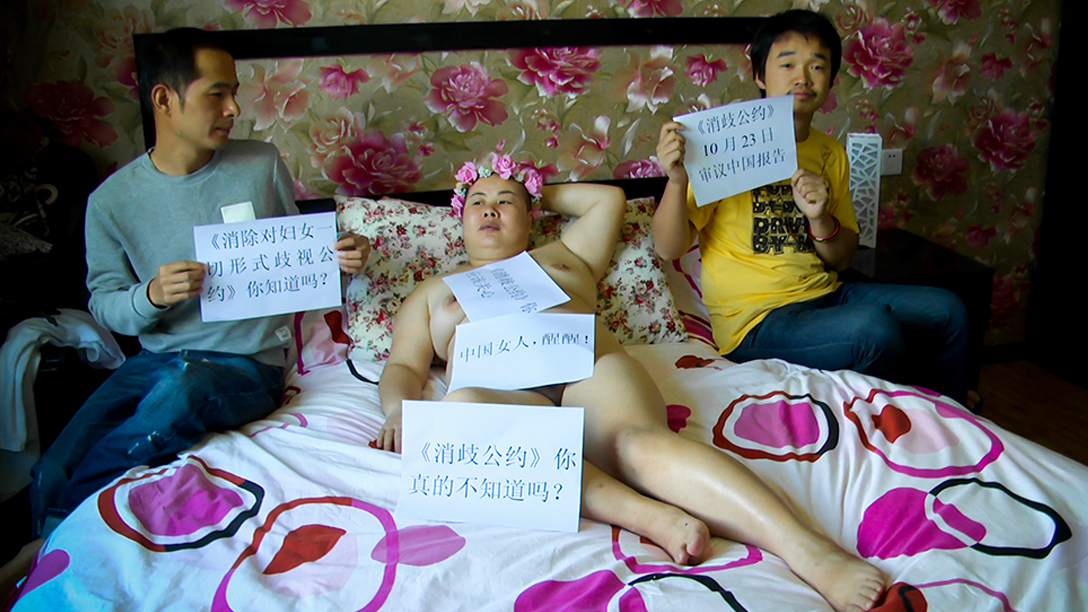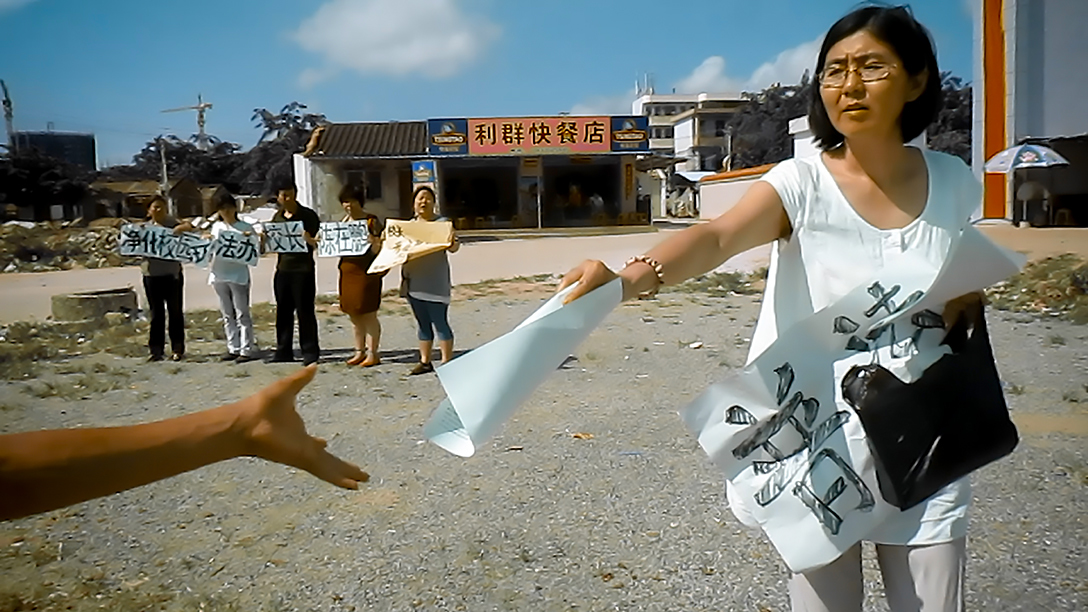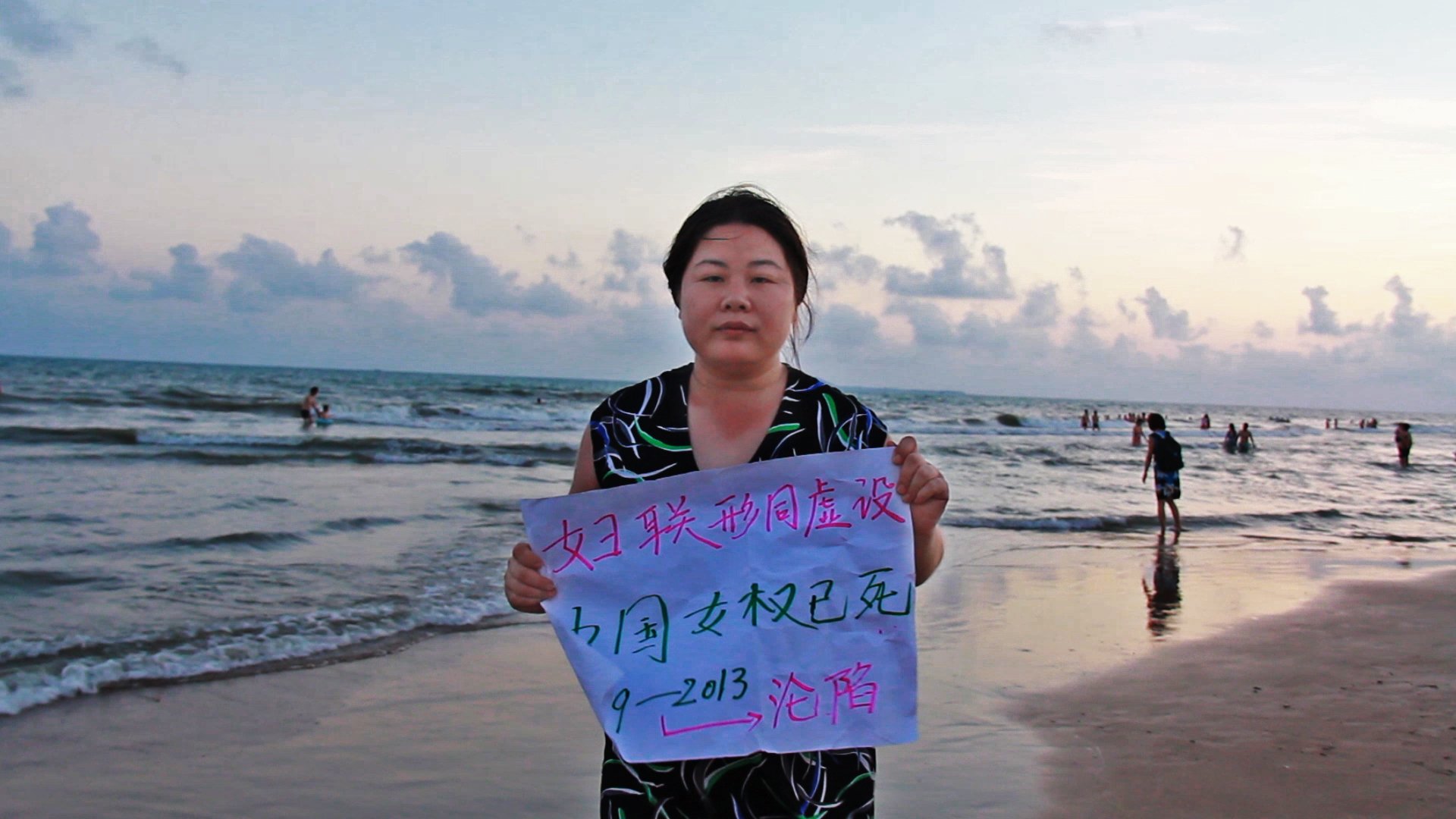Hooligan Sparrow is one of China’s most radical activists. She became a global media sensation, supported by fellow artists like Ai WeiWei, when she offered free sex to migrant workers to highlight the plight of sex workers in China. The exercise inspired Chinese-born, US-based independent filmmaker Nanfu Wang to reach out to Sparrow (real name Ye Haiyan) with a view to working with her on the wider sex workers’ story.
But when Wang arrived in China, Sparrow had moved on to a new case, where a school principal and government official were accused of raping schoolgirls. At a protest Sparrow held a sign which read: “School director: take me to a hotel room — spare the school kids”, a photograph of which inspired hundreds of others to post images of themselves with a similar message online. From here, Wang followed Sparrow, becoming embroiled in the struggle to tackle the injustice.
What followed — as shown in Wang’s film Hooligan Sparrow which debuted at Sundance this year — is an indictment of Chinese state censorship and control as Sparrow and a band of activist friends are harassed, followed, moved from city to city, intimidated, and detained in a bid to shut down questions. All the time, Wang finds ways to film the unfolding story, using glasses with hidden lens, secret recording devices and once, when she feared that her equipment would be confiscated, dismantling her camera completely and hiding the pieces in different parts of an apartment room. She eventually smuggled the footage out of China.
Hooligan Sparrow is screening as part of the Human Rights Watch Festival in London, which starts today. The film is testament to the will of the Chinese activists, some of whom, like human rights lawyer Wang Yu, remain in detention today.

What attracted you to making a documentary about Sparrow?
Sparrow had a huge social media presence for years; I heard a lot about her before I went back to China to make the film. I knew she was bold and confrontational and that she had a unique style of activism, more like a performance artist. When she did her free sex campaign that made me want to do the film. I was always interested in the living conditions of sex workers in China. Growing up in a rural area myself, I witnessed a lot of women who, without access to education, became sex workers.
How did the film’s direction change?
I arrived in China and Sparrow was not doing sex worker advocacy at the time. She wouldn’t tell me where she was. I kept calling her. We met and she was planning a protest against what was huge national news, that a principal and government official raped six young girls aged between 12 and 14.
How did you become involved?
That night before they planned to do the protest they asked me if I could film a testimony because in China people who protest can be arrested, disappear, or die. The government would announce their death saying they committed suicide, something that was usually fabricated. So the activists wanted to do a video testimony saying they wouldn’t commit suicide under any circumstances. I did the videos and went to the protest. After that, the whole story changed.
At this stage did you feel very separate from the activists and the risks they were taking?
They warned me of the risks, but I was very curious. I wanted to find out what really happened in the rape case. I had never been to or seen a protest in China before. The activists asked me to make one of those videos, too. At the beginning I didn’t know how serious it would be; how far the government would go to silence anybody who was trying to tell the story.
When did you understand the pressures the activists were under from the government?
About two weeks later. My family got a call from national security agents. My family were 800 miles away from where everything was happening, I hadn’t told them what I was doing. But one day they got a phone call saying, ‘do you know Nanfu is back, do you know where she is and what she is doing?’ My family were panicked. It was a huge shock to me. I was not involved in politics. There was no reason for the government to look for me. That’s when I realized the scale of the crackdown and censorship.
What kind of tactics were used to shut down the protest?
We were followed all the time. Sparrow was moved out of city to city from one apartment to another. At the beginning I couldn’t understand why each local government would know we were in the city an hour after we arrived. We realized we were being tracked either by phone or the train tickets we bought [you need ID to travel on Chinese trains]. We could not be sure which way they were monitoring us. For me, I don’t really care what happened to me but I have family members who live in China and their jobs could be jeopardized because of what I did.

Did you feel your personal safety was under threat?
Yes. It’s the fear of not knowing what would happen next or who would be arrested or when the police would break into the house. One time, we arrived in a new city in a new apartment about midnight and there were plain clothed police officers already waiting for us. They wouldn’t let us into the building. They chased us when we were trying to get into the home. Then, I felt I had to run, escape. Even when I got inside the apartment I was afraid they would come in. I had hard drives with me at all times; I was afraid they would take them and no one would know what exactly happened; no one would believe what happened without the images. The fear that no one would know what happened was greater than the fear of being arrested.
At that moment — as we see in the film — you keep the camera rolling, saying that you have to document this. Why did you keep filming?
I realized that even though I lived in China for 25 years, I didn’t know that happened in China. Most of my friends and family were interrogated by national security, they didn’t believe that I was innocent and didn’t do anything wrong. I was asked if I was a spy for the U.S. My closest friends wouldn’t believe me. When we were being harassed on the streets by the police, ordinary people would walk by, they wouldn’t even question the secret police because they wouldn’t have access to the information. One of the most frustrating things about China is that the government and the state media controls information. When Sparrow and the lawyers were arrested, they were depicted as criminals. Most ordinary people believed the police because it was their only access to information. I realized at the time I was the only person who could do it; that responsibility was on me.
Would you describe yourself as an activist?
I always say I’m not an activist, I’m a filmmaker. I couldn’t imagine myself going out on the streets to shout slogans. But when lawyer Wang Yu was sentenced to 15 years to life imprisonment I felt extremely angry and sad. I said I would do anything I can to get her freedom. I realized that was an activist’s thought, to do anything you can. Nobody was born an activist. When something happens to people they love or care about, they become activists. I wouldn’t say I’m an activist but the way I use film is some kind of activism.
The Human Rights Watch Film Festival 2016 is on London from March 9-18. Hooligan Sparrow is screeening on March 10 at Curzon Soho ff.hrw.org/london
